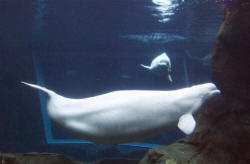 |
|

 Ga. Aquarium expecting rare beluga whale birth
Ga. Aquarium expecting rare beluga whale birth
[April 12, 2012]
ATLANTA,
Ga. (AP)
--
|
The mother, Maris, got pregnant naturally -- not through insemination -- which is rare for belugas in captivity. Maris, whose midsection is bulging and sometimes ripples as the baby moves in her womb, is being monitored round-the-clock as she gets closer to the end of her 14-month pregnancy. She is expected to give birth by June to a calf that could be up to 50 pounds. Newborn calves often don't survive with first-time mothers, but aquarium officials are working to train Maris on how to nurse and care for the baby. "It's all in an effort to desensitize her so when the birth is ongoing, it's nothing out of the ordinary for her," said William Hurley, chief animal officer at the aquarium. They've plopped divers in the cold-water tank at 3 a.m. to help get her accustomed to visitors in the middle of the night in case she goes into labor after hours. They've begun leaving dim lights on in the tank at night so that Maris, who is used to darkness, isn't bothered by the change. Hurley said they're training her to present her mammary glands to different objects so that she's more likely to nurse the baby. On Wednesday morning, trainers worked with Maris on presenting her large belly, which is useful in conducting ultrasounds and doing other medical checkups. She swam from one side of the large tank to the other, playing games with the trainers and chirping happily as they gave her treats. Just six North American facilities house belugas, and just a handful are born each year. The Shedd Aquarium in Chicago also has a pregnant beluga whale. The number of successful births has increased in the last decade as aquariums and other facilities learn more about the whale pregnancies, Hurley said. The Georgia calf's father is Beethoven, the first beluga whale to be born in captivity. "We can learn half of what we need to know about dolphins and whales by studying them in the wild," Hurley said. "But the other half the puzzle...we can only do those things here." |


